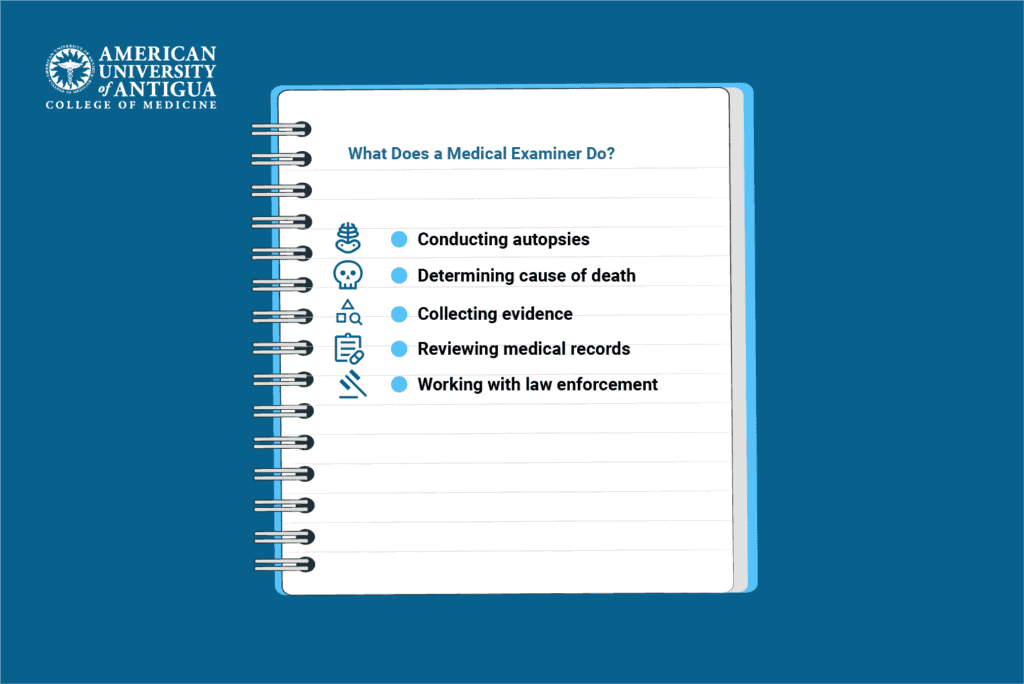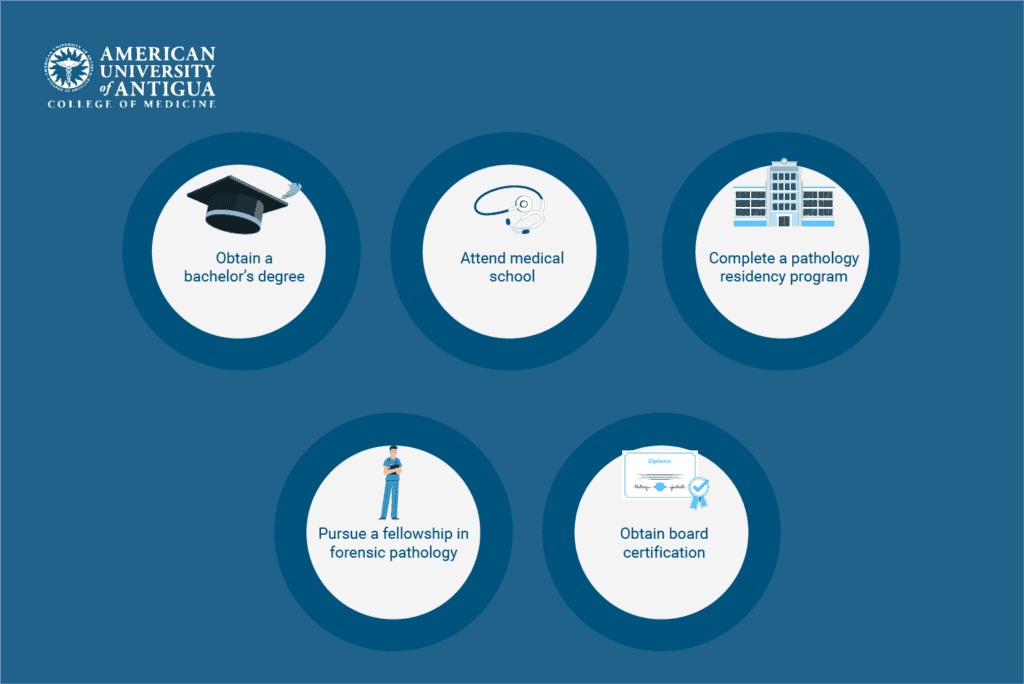How to Become a Medical Examiner in Simple Steps
- Educational path: Bachelor’s degree, medical school, pathology residency, forensic pathology fellowship (13-15 years).
- Responsibilities: Perform autopsies, analyze evidence, determine cause of death, collaborate with law enforcement, and testify in court.
- Key skills: Analytical thinking, attention to detail, problem-solving, emotional resilience, professionalism.
- Career outlook: High demand in certain areas, salary range: $107,000 – $199,000, various career opportunities.
The role of a medical examiner is crucial in both forensics and public health as it combines medicine, law, and justice. Medical examiners are responsible for investigating deaths, determining the cause of death, and providing essential information to support legal processes. Their work often includes resolving complex cases that require scientific expertise and the ability to manage sensitive situations with precision.
The journey to becoming a medical examiner is rigorous and extensive, involving years of education, training, and practical experience. From finishing medical school to obtaining certification, this career can be both challenging and rewarding. For those with a passion for forensic science and a dedication to uncovering the truth, the journey can be deeply fulfilling. In this blog post, you will find a detailed guide to the necessary steps, key skills, career opportunities, and personal and professional considerations for aspiring medical examiners.
✅ Request information on AUA's MD program TODAY!
YOUR PATH TO SUCCESS BEGINS HERE
What Does a Medical Examiner Do?

A medical examiner investigates deaths, specifically those that are sudden, unexpected, or have legal implications. Their key tasks involve performing autopsies, analyzing evidence, and preparing thorough reports to determine the cause and manner of death.
Medical examiners help law enforcement agencies by analyzing and connecting data related to the circumstances of a death, whether it resulted from natural causes, accidents, or other factors. They may also be required to serve as expert witnesses in court, offering their professional opinions and insights on the case.
While both medical examiners and forensic pathologists perform autopsies, medical examiners directly participate in legal cases by collaborating with law enforcement to address the legal aspects of investigations. As such, they mostly deal with cases that require extensive communication with legal professionals. Meanwhile, forensic pathologists are more focused on the medical and scientific aspects of the case and are less involved in the legal process.
Steps to Becoming a Medical Examiner
A commitment to ongoing education, training, and a thorough understanding of both medicine and forensic science is important and necessary in order to become a medical examiner. While the journey may seem lengthy, it starts with earning a bachelor’s degree, attending medical school, and continues with completing a residency program in pathology. Additionally, aspiring examiners may pursue a fellowship in forensic pathology and, lastly, obtain board certification. Although the process is demanding, it is essential to build an extensive background of knowledge and expertise and succeed in the role.

Obtain a bachelor’s degree
The first step to a career as a medical examiner is obtaining a bachelor’s degree. Choosing the right major is fundamental, considering it can build the necessary knowledge and skills for further studies. Majors such as biology, chemistry, or forensic sciences are recommended as they lay the groundwork for medical sciences. Another important aspect is maintaining a high GPA, specifically in science courses, as they will strengthen your medical school application.
Additionally, participating in lab work, internships, or research opportunities demonstrates a commitment to the field and provides valuable hands-on experience, increasing your chances of being accepted into medical school.
Attend medical school
After a bachelor’s degree, the next step in your path to becoming a medical examiner is attending medical school. Students earn either a Doctor of Medicine (M.D.) or a Doctor of Osteopathic Medicine (D.O.) degree after graduation. During medical school, studies are separated into two main parts. In the first year, students focus on courses such as anatomy, pathology, physiology, and other courses relevant to the field. In the second year, they focus on clinical rotations that offer practical experience, such as participating in forensic investigations. This phase prepares students for their future roles as medical examiners and the amount of work they will undertake.
Complete a pathology residency program
For aspiring medical examiners, another mandatory step in the training process is completing a residency program in pathology. Residency, lasting about four years, provides hands-on experience in pathology and equips residents with skills in examining tissues, conducting post-mortem examinations, and interpreting laboratory results — all crucial steps in determining the cause of death. This phase is where future medical examiners master their technical and analytical skills, which are essential for success in a forensic career.
Pursue a fellowship in forensic pathology
Following the residency, a forensic pathology fellowship is critical for individuals specializing in medical examination. This one-year program is designed to train students in performing autopsies, handling forensic evidence, and determining the cause of death. During the fellowship, participants engage in extensive casework that allows them to master autopsy techniques and analyze forensic evidence in real-world scenarios.
In addition, this period involves working closely with law enforcement in collecting, interpreting, and presenting evidence in a legal setting. Fellows also get to prepare official reports and serve as expert witnesses in court, further developing their ability to support investigations and contribute to legal proceedings.
Obtain board certification
Lastly, board certification serves as a formal recognition that a medical examiner has met professional standards and acquired specialized expertise in the field of medical examination. Candidates must pass the American Board of Pathology (ABP) examination to obtain the certification. The exam is an evaluation of their knowledge of forensic investigations, autopsy techniques, and the legal responsibilities of the field. Additionally, this brings better job prospects and increased credibility with colleagues, employers, and the overall legal system. Oftentimes, continuing education and professional development are required to maintain this certification.
Essential Skills and Qualities
For a successful career in medical examination, there are a few key skills and qualities required, including:
- Analytical thinking: Professionals are required to evaluate complex evidence and draw accurate conclusions when determining the cause of death or investigating a death case, which requires robust analytical thinking skills;
- Attention to detail: To ensure that no critical evidence is overlooked, medical examiners are required to examine various aspects and angles of cases and data, taking into consideration every relevant detail;
- Problem-solving: Experts need to overcome any challenges that may arise during investigations by using their problem-solving skills;
- Emotional resilience: Given the sensitivity of the cases, emotional resilience is necessary for handling them without becoming emotionally overwhelmed;
- Professionalism: Ensuring clear communication with law enforcement and affected families while also maintaining an ethical approach to legal matters is crucial for success.
Career Outlook and Salary
Medical examiners have diverse career opportunities in forensic investigation and public service. Their average annual salary ranges from $107,000 to $199,000, depending on experience and job location. Areas with higher populations typically have a greater demand for medical examiners.
Medical examiners can also work for government agencies in death investigations, teach or conduct research in academic settings, or even provide advanced consultations in private practices. Additionally, since they work closely with law enforcement and forensic experts, they can choose to specialize in other medical fields, such as toxicology or anthropology, to expand their expertise.
Is a Career in Medical Examination Right for You?
Before choosing a career in medical examination, you need to thoroughly and carefully consider your interests, strengths, and personality traits. Considering that a medical examiner is entrusted with verifying and determining the cause of death, the field demands a strong sense of responsibility. This career may be suitable for you if you possess strong critical thinking skills, pay close attention to detail, and the ability to remain composed under pressure.
It is also important to recognize that working closely with deceased individuals and supporting grieving families can be emotionally demanding and difficult. In spite of that, a career as a medical examiner could be highly rewarding if you are drawn to seeking justice, contributing to public health, and solving perplexing cases. This job is meant only for individuals who can balance the responsibilities of the role and aspire to make a meaningful impact on society.
Conclusion
Becoming a medical examiner requires going through a challenging yet rewarding journey to acquire a strong background in forensic knowledge and skills. However, after all the hardships, this field allows you to play a crucial role in solving complex cases and make a major contribution to the justice system.
If you have a passion for investigative work, science, and law, a career as a medical examiner may be the perfect fit for you. Explore the opportunities this role offers, or consider other careers within the medical field and take the first step toward a transformative future today!
Frequently Asked Questions
What is the difference between a medical examiner and a forensic pathologist?
A medical examiner oversees death investigations within their jurisdiction, ensuring proper legal procedures are followed. Meanwhile, a forensic pathologist specializes in performing autopsies to determine the cause and manner of death, particularly in cases of suspicious or unexplained deaths.
How long does it take to become a medical examiner?
Becoming a medical examiner requires intensive education and training. This includes obtaining a bachelor’s degree, attending medical school, completing a pathology residency, and even pursuing a forensic pathology fellowship. Altogether, it can take around 13-15 years.
✅ Request information on AUA's MD program TODAY!